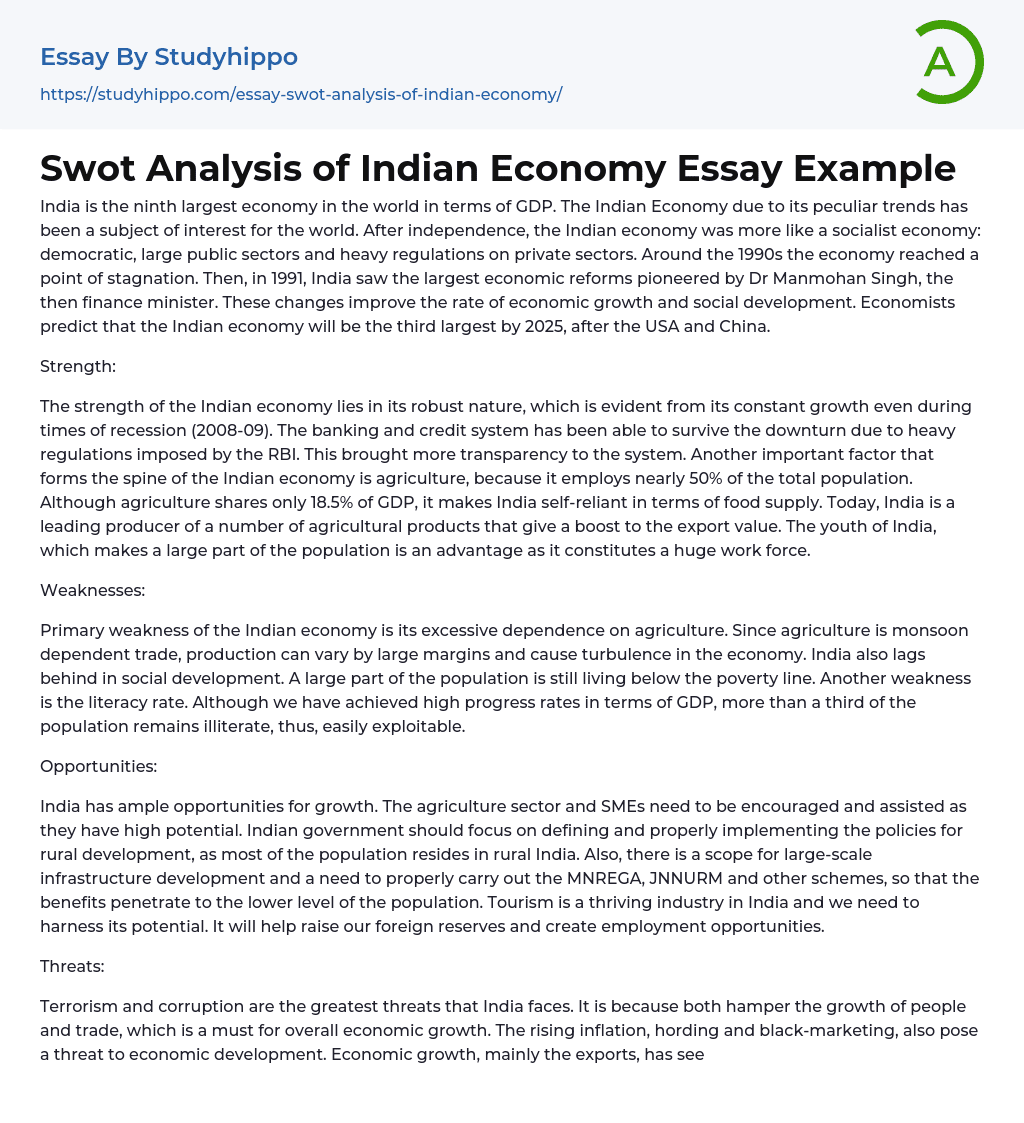Currently ranked as the ninth-largest economy in the world based on GDP, India possesses distinct economic features that have drawn worldwide interest. Post-independence, India adopted a socialist-oriented economic model characterized by democracy, widespread public sectors and stringent regulation of private industries. This approach led to an economic decline by the 90s. In response to this downturn, broad-ranging economic reforms were initiated in 1991 under the guidance of then Finance Minister Dr. Manmohan Singh, triggering both economic growth and social progress. Economists predict that India is on track to become the third-largest economy after the USA and China by 2025.
Vigor:
India's economy, known for its stability and consistent growth even during global economic downturns such as in 2008-09, demonstrates its durability. The resilience of the banking and credit system in tough times can largely be a
...ttributed to the strict regulations imposed by the RBI that promote transparency in the finance sector. Furthermore, agriculture plays a crucial role in India's economy as it employs nearly half of its population. Although it only contributes approximately 18.5% to the GDP, agriculture ensures India's self-sufficiency in food production. Being a major producer of various agricultural products significantly enhances India’s export value. Additionally, having a large young population is advantageous for India due to potential abundance labour supply.
Shortcomings:
A primary issue with the Indian economy is its excessive emphasis on agriculture, a sector vulnerable to unforeseen fluctuations due to its heavy reliance on weather patterns like monsoons. This overdependence can trigger economic instability. Furthermore, social advancement in India is hindered by the significant proportion of individuals living below the poverty line. Another major
economic concern is the wide gap in literacy levels throughout different regions of the country. Despite impressive improvements in GDP growth, illiteracy continues to affect over one-third of the population, leaving them susceptible to manipulation.
Possibilities:
India possesses massive potential for progress. The agricultural sector and Small-Medium Enterprises (SMEs) should receive support and incentives due to their promising prospects. The Indian government needs to concentrate on formulating and successfully executing policies for the upliftment of rural areas, given that the majority of the Indian populace lives there. Moreover, there's an opportunity for extensive infrastructure enhancement, and it's critical to effectively execute projects like MNREGA, JNNURM, and other similar programs, ensuring that their benefits percolate to the less privileged sections of society. Tourism is a flourishing sector in India with untapped potential that needs to be leveraged. Doing so can boost our foreign currency reserves and generate job prospects.
Dangers:
India is primarily challenged by issues like terrorism and corruption that considerably obstruct the development of individuals and businesses, crucial for economic progression. Other obstacles to financial improvement include escalating inflation, stockpiling, and black-market operations. The global economic slump has negatively affected export expansion, raising apprehensions. Consequently, it's imperative for the Indian government to modify its policies and implement strict reforms to navigate these challenges.
- American Dream essays
- Barriers To Entry essays
- Capitalism essays
- Central Bank essays
- Compensation essays
- Consumerism essays
- Economic Development essays
- Economic Growth essays
- Economic Inequality essays
- Economic System essays
- Economy essays
- Employment essays
- Export essays
- Finance essays
- Free Trade essays
- Gross Domestic Product essays
- Human Development essays
- Income Inequality essays
- Industry essays
- Inflation essays
- International Business essays
- International Trade essays
- Macroeconomics essays
- Materialism essays
- Max Weber essays
- Microeconomics essays
- Minimum Wage essays
- Monetary Policy essays
- Monopoly essays
- Pricing essays
- Profit essays
- Recession essays
- resources essays
- Taxation essays
- Trade essays
- Unemployment essays
- Warehouse essays
- World economy essays
- Bangladesh essays
- China essays
- Hong Kong essays
- India essays
- Japan essays
- Kuala Lumpur essays
- Malaysia essays
- Manila essays
- Pakistan essays
- Philippines essays
- Singapore essays
- Vietnam essays




